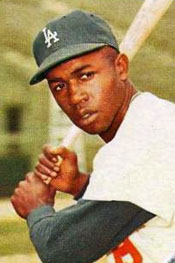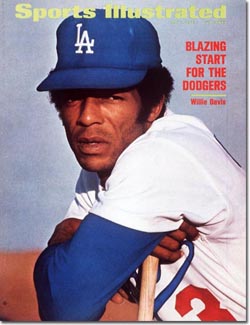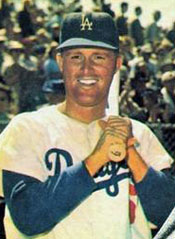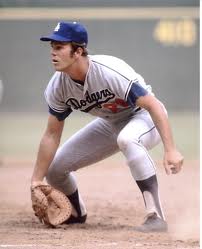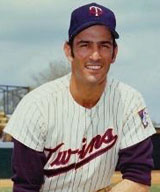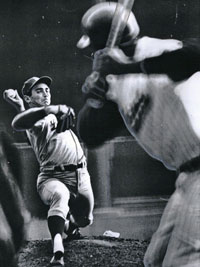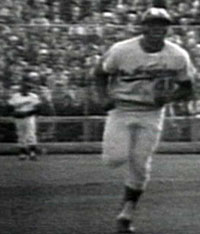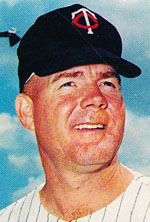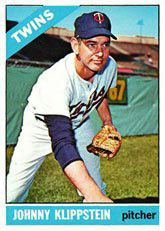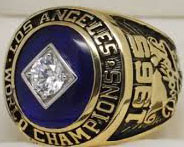1965 - Game 7: Los Angeles Dodgers @ Minnesota Twins
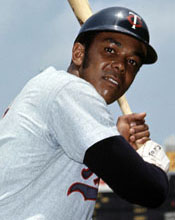
Tony Oliva
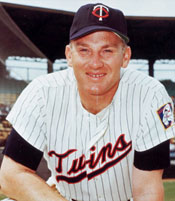
Harmon Killebrew
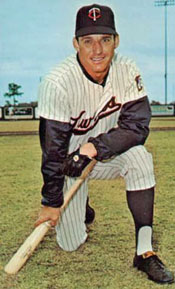
Bob Allison
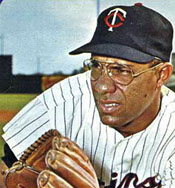
Zoilo Versalles

Jimmie Hall
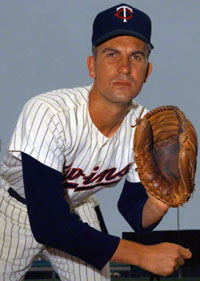
Jim Perry

Jim Lefebvre
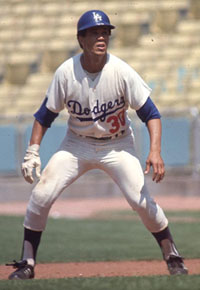
Maury Wills
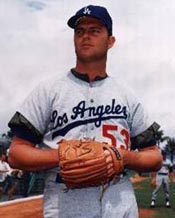
Don Drysdale
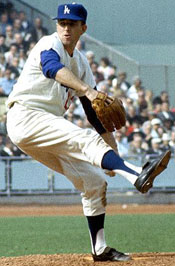
Claude Osteen
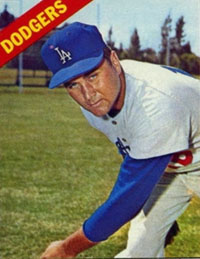
Ron Perranoski

Mudcat Grant pitches in Game 1
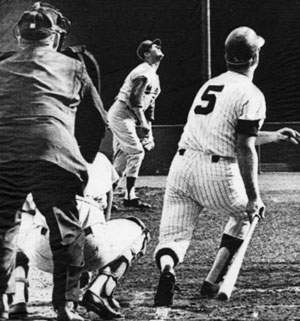
Don Mincher smacks a HR off Don Drysdale in Game One.
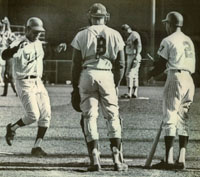
Grant touches home after his roundtripper in Game 6, the first AL P to hit one in 45 years

Jim Kaat
|
Pennant Races
For the first time since 1945, the Yankees were not a factor in the AL pennant race. Their sixth-place finish was the franchise's worst since 1925.
- That opened the door for a new contender, the Minnesota Twins, who had finished sixth themselves in 1964. The Twins won the franchise's first pennant since 1933 in their fifth season in the midwest after moving from Washington, where they were known as the Senators.
- They won by seven games with a power attack and a surprisingly good pitching staff.
- Minnesota led the AL with a .254 BA behind Tony Oliva's league-best .321.
- When someone said "Twins Power" in the early '60s, you thought of Harmon Killebrew. But he clouted only 25 HRs in '65, his lowest total since he became a regular in 1959. That still led the club, followed closely by LF Bob Allison's 23, 1B Don Mincher's 22, and CF Jimmie Hall's 20. Part of the reason for Killebrew's low total was that he missed six weeks because of a dislocated elbow.
- But it was SS Zoilo Versalles who won the MVP award because of his outstanding fielding and leading the league in runs, doubles, triples, and total bases (as well as strikeouts).
- Mudcat Grant emerged as the star of the mound staff with 21 victories, six more than he had won before in his eight-year career that began with Cleveland. He would never win more than 13 again.
- Steady southpaw Jim Kaat contributed 18 wins, and Jim Perry added ten. The staff's 3.14 ERA was good for third place in the junior circuit.
Walter Alston's Los Angeles Dodgers returned to the top of the NL after a year's hiatus.
- The '65 Dodgers were the classic speed and defense team.
- They finished dead last in the majors in HRs. Their 78 roundtrippers were a little over half the Twins' 150. 2B Jim Lefebvre and LF Lou Johnson led the squad with a mere 12 four-baggers each.
- LA didn't have a single .300 hitter and finished eighth in the ten-team league with 608 runs.
- SS Maury Wills led the league in steals for the sixth straight year with 94, his best total since setting the all-time record of 104 in 1962. He also topped the Dodgers with his .284 average.
- The Big Two, southpaw Sandy Koufax and righty Don Drysdale, led the staff that allowed the fewest runs in the league. Koufax led the NL with 26 victories, against only eight losses, 2.04 ERA, 27 complete games, 335 2/3 innings pitched, and 382 strikeouts. Drysdale wasn't far behind in victories with 23 to go with a 2.77 ERA. Another lefty, Claude Osteen, threw in 15 victories but, despite a 2.79 ERA, also lost 15. Ron Perranoski led the bullpen with 18 saves.
- The Dodgers had a tougher time clinching their pennant. They had to win 15 of their last 16 to finally overtake the San Francisco Giants.
The oddsmakers installed the Dodgers as 7-to-5 favorites. However, they started the series with several challenges.
- First, LA GM Buzzie Bavasi riled everyone in the Twin Cities by saying that he thought his NL champs can win four straight, just as they in '63 against the Yankees. VP Fresco Thompson poured fuel on the fire by saying that the NL "has 20 better pitchers than Grant."
- Twins lefthander Dick Stigman responded, The Dodgers are making a mistake if they underrate us. We know they have speed and pitching, but we have that and power too.
- Minnesotans felt their team won the pennant because they didn't rely solely on homers but learned to bunt, steal, and hit-and-run - what would come to be known in a later age as "small ball." Dodger scout Al Campanis: They started playing the game the way we play it in the National League.
- Furthermore, Alston would not be able to start his ace, Koufax, in Game One because October 6 fell on Yom Kippur, the most sacred of Jewish High Holidays. Instead, Drysdale would start the opener - not a bad choice. The lanky righthander finished the season with a five-game winning string, including shutouts in his last two starts.
- By not appearing until Game 2, Koufax would probably not be able to start three times if the Series went the distance.
- The Twins feared Wills. Stigman: We had some good baserunners in our league, but nobody like Wills. I remember how bad the Dodgers made us look in an exhibition at Vero Beach last spring. Grant, the Twins' opening game starter, didn't remember ever facing the Dodgers. I pitched against Wills in the Coast League eight years ago, but that was before Maury became such a much better player. He was nothing then, compared to now.
- Fans looked forward to the duel between the opposing shortstops: Wills and Versalles.
- Grant stirred up some waters of his own when a newspaper story quoted him as saying, Drysdale has a reputation for knocking down hitters. If he does it to our guys, there'll be some Dodgers on their backs too. Mudcat admitted he said it but claimed it was all in fun. I'm not trying to start anything.
- One question mark for Minnesota was whether Tony Oliva would show any ill effects after missing the last five games with a pulled leg muscle.
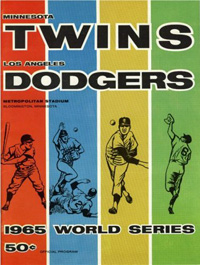 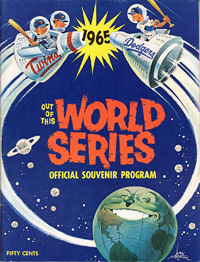

Vice President Hubert Humphrey, former Senator from Minnesota, throws out
first pitch before Game One with Commissioner Ford Frick at his right
along with Twins owner Clark Griffith and the two managers.

Series Results
- Wednesday, October 6 @ Minnesota: Twins 8 Dodgers 2
WP: Mudcat Grant; LP: Don Drysdale
- Thursday, October 7 @ Minnesota: Twins 5 Dodgers 1
WP: Jim Kaat; LP: Sandy Koufax
- Saturday, October 9 @ Los Angeles: Dodgers 4 Twins 0
WP: Claude Osteen; LP: Camilo Pascual
- Sunday, October 10 @ New York: Dodgers 7 Twins 2
WP: Drysdale; LP: Grant
- Monday, October 11 @ Los Angeles: Dodgers 7 Twins 0
WP: Koufax; LP: Kaat
- Wednesday, October 13 @ Minnesota: Twins 5 Dodgers 1
WP: Grant; LP: Osteen
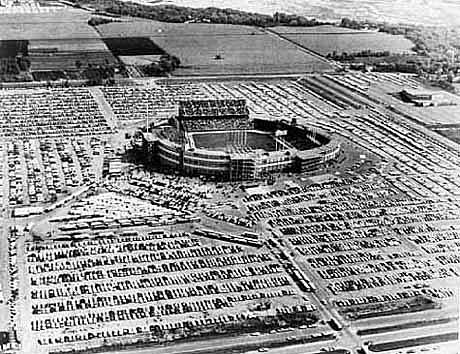
Metropolitan Stadium, Bloomington MN, 1965 World Series The Twins got off to an excellent start.
- Drysdale's hot finish didn't carry over as he didn't last three innings in the opener, an 8-2 Twins romp. Then Kaat outpitched Koufax in Game Two.
- However, the Dodgers dominated in their home park, winning all three by a combined 18-2. Drysdale and Kaat got revenge on Grant and Kaat.
- But the trend of the home team winning every game continued in Game 6 as Mudcat pitched a complete game on two days' rest.
- The Dodgers had checked out of their hotel the morning of Game 6 and had to scramble to find accommodations for another night.
Drysdale or Koufax?
- That was the headline in newspapers across the country the morning of Game 7.
- After Game 6, Alston pronounced himself undecided. I haven't completely decided yet who'll pitch. I really don't know. I may decide tonight when I give it more thought, or they both might warm up. Drysdale's had the extra day of rest, but everything being equal, I'd rather pitch a lefty against this club. The Dodger skipper revealed that Drysdale hurt his hand the other day when the bat broke in half while he was batting. However, he didn't think that would affect Don if he decided to start him. Drysdale said his hand had been swollen after Game 4 but that the swelling had subsided. There's nothing really wrong.
- When asked what would happen if the predicted rain fell, Walt said he would start Koufax with the extra day's rest.
- Alston denied that he had complained to the umpires about the condition of the field for Game 6. Just before game time, the ground crrew appeared to be clearing the top layer of dirt or sand off the first base line and around the base. A ploy to blunt the Dodgers' speed? I made no complaint, he said. We turned it over to the umpires. All we asked the men to do was look at it.
- When asked about what the ground crew had done, the fleetest Dodgers, Wills, refused to talk.
Game 7: Thursday, October 14 @ Bloomington MN
Alston revealed his pitching choice at a team meeting that morning.
- He and his coaches, Preston Gomez, Danny Ozark, and Lefty Phillips, decided Wednesday night to go with "the lefthander." However, none of them told either Koufax or Drysdale of their decision before the two mound stars heard the decision with the rest of the team. In fact, both of them arrived at the park unshaven, which was the habit of the Dodgers starter.
Koufax had assured Gomez after Game 6 at his locker that "I'm okay for tomorrow."
Fred Wilpon, a high school classmate of Koufax who later became majority owner of the New York Mets, told biographer Jane Leavy that Koufax "didn't want to be known as a person who couldn't have the strength and the ability to take the ball on two days' rest."
Alston told L.A. sportswriter Mel Durslag that it was the hardest decision he ever made as manager. Durslag recalled: He was worried about Drysdale's feelings and afraid of saying something anti-Semitic. He was an uptight guy, not a loose guy. People intimated - he was a farmer from the middle of Ohio - that he might have been anti-Semitic. Maybe he felt if he didn't give it to Koufax, he'd look anti-Semitic.
The players were nearly unanimous is their choice. They wanted Sandy. Captain Wills later said, We might not have gone on the field if he hadn't.
After the brief meeting in which Alston told his club We're going to start the left-hander, Koufax told 2B Dick Tracewski, He called me "the lefthander." Tracewski recalled, He felt he should have called him by his name.
- Part of Alston's reasoning was that, if Koufax faltered, he could bring in a righthander, Drysdale, to "flip" Twin batters, then close up with another southpaw, Perranoski.
- Twins manager Sam Mele also sent out a man with only two days' rest, Jim Kaat. Thus Game 7 would provide the third matchup of the two lefties.
- The rains came in the wee hours of Thursday morning, but the weather cleared by daybreak Helicopters helped dry out the outfield. The temperature at game time was 60° with a light haze.
- Neither manager pulled any surprises in his lineup. Alston had to go with Dick Tracewski at 2B due to the injury to Jim Lefebvre, who would have completed an all-switch-hitting Dodger infield.
Kaat recalled the pregame handshake of the starters for the photographers. Jim's eyes started to water, then tear, then burn. He got away from Koufax as quickly as possible to escape the smell of Capsolin, a powerful anti-inflammatory ointment that Sandy lathered on his aching left elbow.
Watch the entire game
|
Los Angeles Lineup
| Maury Wills |
SS |
| Junior Gilliam |
3B |
| Willie Davis |
CF |
| Lou Johnson |
LF |
| Ron Fairly |
RF |
| Wes Parker |
1B |
| Dick Tracewski |
2B |
| John Roseboro |
C |
| Sandy Koufax |
P |
|
 |
 |
Minnesota Lineup
| Zoilo Versalles |
SS |
| Joe Nossek |
CF |
| Tony Oliva |
RF |
| Harmon Killebrew |
3B |
| Earl Battey |
C |
| Bob Allison |
LF |
| Don Mincher |
1B |
| Frank Quilici |
2B |
| Jim Kaat |
P |
|
|
|
|
A Metropolitan Stadium record crowd of 50,596 and tens of millions watching on TV saw one of the great pitching performances in World Series history.
1st inning
- Jim Kaat took his herky-jerk motion to the mound looking forward to the challenge of Game 7.
Taking no chances, manager Sam Mele had lefty Jim Merritt and righty Johnny Klippstein working in the bullpen from the start.
Captain Maury Wills, batting righthandped, took a 2-2 fastball for strike 3.
Another switch hitter, 3B Junior Gilliam, lined the first pitch into LF for a single.
Willie Davis, with six hits in the Series, drag bunted on one high hop to Kaat, an excellent fielder who looked at 2B but threw Willie out at first.
LF Lou "Way Out" Johnson, with seven hits in the six games, blooped the first pitch into RF. Tony Oliva ran in hard and caught it leaning forward before tumbling to the ground to save a run.
Johnson had played for 18 teams in 13 years as a professional. He started in class D in 1953 and worked his way up to AAA by 1960.
He played in 96 ML games from 1960-62 with the Cubs, Angels, and Braves. He had decided that 1965 would be his last year of baseball if he didn't make a big league club. But he caught on with the Dodgers and played his first full season in the bigs. He hit .259 with 12 HRs and 58 RBIs.
- Bespectacled Zoilo Versalles, with seven hits, including a homer, fanned.
Joe Nossek, playing CF in place of lefthanded-hitting Jimmie Hall,
bounced to Wills, who charged the ball and threw out the runner.
Oliva, who hit lefthanders well, said after Game 2 that Koufax had the best curveball he'd ever seen from a lefthander. But this day, Sandy had trouble controlling his hook. Tony ran the count full before walking.
The crowd got excited as 3B Harmon Killebrew stepped in. Trying to find his release point, Koufax issued a four-pitch walk - to passes in a run from a pitcher who issued only 71 in the regular season against 382 Ks.
Don Drysdale started warming up.
C Earl Battey took two straight strikes. Then, after a ball, he swung through a high hard one.
2nd inning
- RF Ron Fairly, a hot 10-for-25 (.400) in the Series and leading all hitters with 6 RBIs, popped to Battey just in front of the plate.
1B Wes Parker, another switch hitter, hit a weak pop to 1B Don Mincher in foul ground.
2B Dick Tracewski, who made a crucial error in Game 6, took a called third strike.
- After struggling in the first, Koufax breezed through the second.
LF Bob Allison waved at an 0-2 curve in the dirt.
Mincher, the only other lefthander in the lineup besides Oliva (and Kaat), was called out on a 2-2 fastball.
2B Frank Quilici popped the first pitch to Wills behind 2B.
3rd inning
- C Johnny Roseboro lined a double just inside the RF line.
A righthanded batter, Koufax had a hit and an RBI in the Series, but the Twins expected a bunt. Sandy fouled off one bunt attempt and took balls on several other tries before taking a high one for a full-count free pass.
With Versalles holding Roseboro close, Wills had lots of room on the left side of the infield. Maury fouled off three pitches before hitting a high hopper to Quilici, who took it moving toward 1B and tossed out Wills. The play had the same effect as a bunt except Maury was charged with a time at-bat.
Appearing in his sixth World Series,
Gillliam hit a short fly to RF that Oliva took. Roseboro held at third, although the throw to the plate got away from the C. Kaat backed up the play to prevent the run from scoring.
Killebrew played opposite the bag at 3B when Davis batted. Mixing speeds, Kaat got out of the jam when Willie fouled to Battey.
- Kaat had a single that knocked in two runs earlier in the Series. Jim whiffed on a high hard one - Sandy's fifth K already.
Koufax hung a curveball to Versalles, who whacked it into CF for the Twins' first hit.
With Nossek at the plate, Zoilo took off for second and easily stole the bag. But home plate umpire Ed Hurley called Nossek out for interfering with Roseboro's throw and sent the runner back to 1B.
While Oliva was batting, 3B coach Billy Martin questioned Koufax's delivery, claiming he wasn't coming to a full stop. If the intent was to distract or upset the hurler, the ploy didn't work, as Oliva went down swinging.
4th inning
- Kaat started Johnson with a slow curve, then a slider which the hitter was out in front of. So Jim tried to bust a fastball past him in tight. But Tony got around on it and lofted the ball off the LF pole for his second HR of the Series. Tony applauded as he rounded the bases.
Before taking the field for the finale, Johnson called his mother for the first time before a game. He told her, I'm going to do something today, Ma. I told Sandy I was gonna get him a run.
Fairly smacked the first pitch, a hanging slider, into the RF corner and easily made 2B.
Al Worthington got up in the bullpen.
Parker likewise picked on the first pitch and bounced the ball over the drawn-in Mincher at 1B. Fairly scored and, when Oliva dropped the ball as he tried to throw, continued to 2B on the error.
That brought Mele out to call for the righthanded reliever.
Tracewski tried to bunt but popped to Worthington running toward the 3B line and almost crashing into Killebrew.
Roseboro walked on four pitches.
Koufax dribbled the ball back to the mound for a swinging bunt that advanced both runners.
Wills switched to the opposite batting box against Worthington. With a chance to double the lead, Maury fouled to Killebrew.
Dodgers 2 Twins 0
- With their ace southpaw on the mound, two runs seemed like money in the bank to the Dodgers. Nothing in the bottom of the 4th changed that mindset.
Killebrew bounced to the mound.
Battey flied to center.
Allison smacked the first pitch straight to Gilliam, hugging the line. Score it 5-3.
5th inning
- Quilici took a big hop off the bat of Gilliam and tossed to Mincher.
Killebrew took care of Davis's foul pop near the Dodger dugout.
Johnson hit a long fly to RCF that Oliva caught backhanded just short of the warning track.
- Mincher picked on the first pitch and popped to Gilliam, who took it just in foul territory behind 3B.
Quilici got hold of a 2-1 fastball and sent it on one hop off the LCF fence for a double.
That put Drysdale back into action in the Dodger bullpen.
Rich Rollins hit for Worthington. Koufax threw his first curve in quite some time on 2-2 but didn't get the call. The crowd grew restless as Sandy stepped off the rubber, and Roseboro came out to chat. Rollins then drew a base on balls.
Alston made a trip to the mound but made no move to the bullpen.
Walt said after the game that he had no intention of taking Koufax out because he was pitching just fine. He just cautioned him against trying to overthrow and hanging a curve.
After Versalles stepped in, Koufax met Roseboro midway to home plate, drawing more boos from the fans. Throwing all fastballs to the AL MVP, Zoilo smashed a grounder just inside the 3B bag but Gilliam, guarding the line, backhanded it and ran to the bag for the forceout. Jim's play prevented a double that would have scored at least one run.
Nossek bounced to Wills, who flipped to Tracewski for the force to end the rally.
After Gilliam had a poor 1964 season, the Dodgers accelerated their plans to make him a coach. But his replacement, John Kennedy, acquired with Osteen from Washington for Frank Howard, hit only .185 in the first ten games of '65. Then Tracewski did no better (.217). After 30 scoreless innings of offense, GM Buzzie Bavasi decided to reactivate "Old Slowfoot," Gilliam, who had kept himself in shape.
6th inning
- A former Dodger, Johnny Klippstein, toed the slab for the Twins. A few days away from his 38th birthday, Johnny started in professional baseball in 1944.
Fairly skied the first pitch to Allison in LF.
Parker, from the left side now, hit a changeup over Nossek's head in CF, off the fence on one bounce, and legged into third standing up.
The infield came in for Tracewski. Alston called for an 0-1 squeeze, but Dick fouled it off. Then the Dodgers tried it again on a 3-2 pitch, but the batter again bunted foul for a strikeout.
The Twins walked Roseboro intentionally to get to Koufax.
Sandy took two cuts, then two balls, then fanned.
- After his shaking 5th, all Dodgers eyes were on Koufax. Would he continue to struggle?
Oliva launched one of his patented flying bats on a swing and miss. Tony made Sandy work, fouling off several deliveries, before missing a low 3-2 blazer.
Killebrew hit a high foul that Johnson caught a few feet from the box seats down the LF line.
Battey rocketed a low fastball straight at Wills.
7th inning
- Wills hit a chop over the mound that Versalles fielded by the bag and quickly threw to 1B for the out.
Gilliam pulled a grounder in the hole between second and first.
Klippstein's curve ball hit Davis on the back foot to put runners at 1st and 2nd.
Johnson bounced a fast ball to Killebrew, whose only play was to first.
Mele brought in the lefthander, Merritt, to face Fairly.
Facing another opportunity to expand the lead, Fairly flew to Oliva.
- Allison whacked the first pitch, a rare curve ball, on the ground to Wills. Dodgers announcer Vin Scully, on the NBC broadcast, again wondered why the Twins were swinging at the first pitch so much against a pitcher hurling with only two days rest.
Mincher made Koufax work, fouling off several pitches before one pop stayed playable for Roseboro near the home team on deck circle.
After Quilici swung through a high hard one, Koufax threw three straight curves, one of which was grounded foul. Then he poured a fast ball down the middle that Frank missed.
8th inning
- Merritt looked sharp with a fastball and sharp curve.
Parker had reached 3B twice but failed to score. He hit a low liner that Quilici grabbed on the short hop to his glove side.
Tracewski hit the pitch for a 5-3 out.
Roseboro whiffed.
- A left-handed batting and throwing outfielder, Sandy Valdespino, who pitched batting practice to simulate Koufax as best as possible, pinchhit for Merritt. He hit a foul fly down the LF line that Johnson snared just beyond the temporary box seats a few feet from the permanent grandstand.
The Twins now reached the top of their order. This was the time to make something happen.
Versalles socked a long drive that Johnson caught on the warning track in LCF.
Nossek rapped an easy grounder to Wills.
9th inning
- Righthanded starter Jim Perry took over the mound chores for the Twins.
Koufax received a nice round of applause as he made his way to the plate. In today's baseball, it would be unthinkable to let your starter in Game 7 pitching on two days rest bat for himself in the 9th when you led by only two runs. You send up the pinchhitter in hopes to starting a rally, then call on your highly-paid closer to earn his keep. But this was a different era.
Sandy took his cuts and sat down.
Wills walked on a 3-2 pitch.
Trying to manufacture an insurance run, Maury took off on the first pitch, but Battey's throw to Quilici nipped him.
Gilliam grounded to Versalles, whose throw
almost pulled Mincher off the bag.
- To seal the victory, Koufax would have to retire the heart of the Minnesota order: Oliva, Killebrew, and Battey in his 360th inning of the season. Sandy had now shut out the AL champs for 17 straight innings.
John Kennedy replaced Gilliam at 3B for defensive purposes despite the fact that Junior had probably made the defensive play of the game
in the 5th inning.
Oliva swung at the first pitch and again let the bat fly toward the 1B coaching box. Several pitches later, he bounced harmlessly to Kennedy.
That meant that slugger Killebrew could not tie the game with a circuit clout. Harmon rapped the 2-1 pitch between SS and 3B for a single to break Koufax's string of 12 straight retired. It was only the Twins' third hit.
Now the tying run came to the plate in the person of Battey. Earl quickly fell into the hole with swings and misses at two straight high hard ones. Sandy poured another right down the middle belt high for called strike 3.
Allison stood in as the Twins' last hope.
Could he lift one into the 10 mph breeze blowing out to left? Behind in the count 2-1, Sandy seemed to reach back for a little extra and fogged two straight too fast for Allison's swing to make contact.
FINAL: Dodgers 2 Twins 0
Koufax and his teammates didn't show a great deal of elation as they ran in to congratulate their southpaw and head to the dugout to celebrate the franchise's third World Series championship in Los Angeles.
Wes Parker at 1B recalled, I'd been dreaming about this my whole life. I was ready to go nuts. I'm running toward the mound, and there's no noise. I'm wondering if someone called time. But no, the Minnesota fans were filing out. I looked at Sandy. Sandy wasn't doing anything. He didn't pump a fist or jump in the air. He was just walking toward Roseboro.
Postgame
Dodgers Clubhouse
- Vince Scully interviewed Koufax in the locker room for NBC TV. He reminded Sandy that, after pitching a shut out in Game 5, he said, "I feel like I'm a hundred years ago." Then Vin asked Sandy how he felt today. "101," the lefty replied with a slight smile. Then he quickly added. "No, I feel great, Vinny. I know I don't have to go out there any more for about four months." When Scully pointed out that he seemed to stick mainly with his fastball, Sandy replied: "I didn't have the curve ball at all and wasn't getting it over." He admitted he was tired but not as much as at the end of Game 5. He cited the cooler weather in Minnesota as helping his stamina. "My fast ball the last three or four innings was as good or better as earlier in game."
His arthritic left elbow encased in ice,
Koufax told writers shortly afterward: I'm going away as far as I can. I'm going to leave shortly for Hawaii and then go on from there. Where I don't know - and I really don't care right now. I think I'm entitled to a vacation. ... Dr. Kerlan (Dodger club physician) will take X rays of the arm to see if there has been any change in the condition of the arm. Right now it feels fine. That fact that I know I don't have to use it for the next 4 1/2 months makes it feel even better.
- Dodgers owner Walter O'Malley pushed through the crowd and threw his arms around his manager. Walt, it's getting to be a habit. The skipper replied: We sure did it the hard way.
- Alston added for the press: This is a club that all year long has had to battle. All year long, this team has scratched. On Koufax: He's just the best lefty I've ever seen. On his visit to the mound in the 5th: He was still throwing good. Even if Versalles' hit gets by Gilliam, I kind of doubt if I'd take him out that quickly. I know he's throwing good.
On learning that he had passed a baseball legend for World Series championships. I was surprised at hearing that I had passed John McGraw. I had never met him or seen him play or manage. But I've heard a lot about him. As for me, I'm just thankful that I've been as luck as I have been. Believe me, I just love baseball, and I only wish I could stick around here 50 more years.
- Louis Brown Johnson, whose initials were the same as President Lyndon Baines Johnson, talked about his homer. Kaat threw me nothing but curve balls the first two games he pitched, and I figured it was about time he threw me a fast one. And sure enough, just as big as life, there was a fast ball, and I was waiting for it. It was a great thrill, but it wasn't my biggest. If I hadn't hit that home run off Joey Jay of Cincinnati in the 12th inning (in the last week of the season to put the Dodgers in first place), we wouldn't even be here. That homer gave me my biggest thrill.
Twins Clubhouse
- Mele: It took another great performance by him (Koufax) to beat us. My guys played good, dammit. I told them they did a fine job, to keep their chins up, and we'll start after another one next spring. ... Our pitchers pitched well. We just didn't hit that son of a gun. Jim Kaat wasn't throwing bad, but you give those guys two runs, and you've got to stop them right there. We stopped the rally, but they already had the two runs.
Mele, like Alston, considered Gilliam's fielding gem in the 5th inning the turning point of the game. It meant one run for sure and a chance to score another and maybe we could have got two, depending on how it caromed off the fence. It was a great play. There's no doubt about it.
- Allison on Koufax: He's a great pitcher. I just wish I could have been hitting. It would have been entirely different.
- Killebrew: He's just one heck of a pitcher. I thought when Herb Score was throwing his best, he was better. But I'm not taking anything away from Sandy because he's great.
- Mincher: I guess he's the best I ever saw. But I think we gained their respect. That's one thing.
The Series attendance totaled 364,326.
- Each Dodger took home $10,297.
- Every member of the losing team earned $6,634.
A crowd of 8-10,000 in supposedly jaded Los Angeles welcomed the Dodgers home that night.
- We want Sandy! We want Sandy! they chanted. But Koufax, who won the Series MVP award, was hustled out a side exit to avoid a mob scene.
- Another fan favorite was Lou Johnson. I touched him! I touched him! screamed one young fan after patting Johnson on the shoulder as he moved through the crowd.
- Ron Fairly exclaimed, Greatest ball club I've ever been on and the greatest ball club I ever hope to be on.
|
Several articles published shortly after the World Series led people to believe that Sandy Koufax didn't even like baseball.
Time magazine's next issue included a World Series article that contained these statements: Just because a man does his job better than anybody else doesn't mean that he has to take it seriously - or even like it. ... To his teamates, even to his few close friends, Koufax's aloofness is often downright annoying. ... Dodger vice president Fresco Thompson considers him a heretic. "I don't think he likes baseball ..."
His comments to Scully after Game 7 were seized by some as evidence of Koufax's dislike of baseball. But what Dodger wasn't looking forward to four months off?
The Time article hurt and irritated Koufax, to the point that he told Ed Linn, his biographer: I have nothing against myths. But there is one myth that has been building through the years that I would just as soon bury without any particular honors: the myth of Sandy Koufax, the anti-athlete. The way this fantasy goes, I am really a sort of dreamy intellectual who was lured out of college by a bonus in the flush of my youth and have forever after regretted - and even resented - the life of fame and fortune that has been forced upon me.
Koufax endured one more season of arm miseries before retiring at age 30. But what a final season it was! 27-9, 1.73 ERA, 41 games, 27 complete, 323 IP, 317 K. The wins, ERA, games started, innings, and strikeouts all led the league.
References: The World Series, David S. Neft & Richard M. Cohen (1990)
The Seventh Game, Barry Levenson (2004)
Sandy Koufax: A Lefty's Legacy, Jane Leavy (2002)
Next in this series: 1967: St. Louis @ Boston
|
|






















